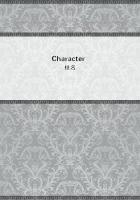My own belief is,and it is surely simple and rational enough,that Raleigh's 'brains,'as he said,'were broken';that he had no distinct plan:but that,loth to leave the New World without a second attempt on Guiana,he went up to Newfoundland to re-victual,'and with good hope,'as he wrote to Winwood himself,'of keeping the sea till August with some four reasonable good ships,'probably,as Oldys remarks,to try a trading voyage;but found his gentlemen too dispirited and incredulous,his men too mutinous to do anything;and seeing his ships go home one by one,at last followed them himself,because he had promised Arundel and Pembroke so to do;having,after all,as he declared on the scaffold,extreme difficulty in persuading his men to land at all in England.The other lies about him,as of his having intended to desert his soldiers in Guiana,his having taken no tools to work the mine,and so forth,one only notices to say that the 'Declaration'takes care to make the most of them,without deigning,after its fashion,to adduce any proof but anonymous hearsays.If it be true that Bacon drew up that famous document,it reflects no credit either on his honesty or his 'inductive science.'
So Raleigh returns,anchors in Plymouth.He finds that Captain North has brought home the news of his mishaps,and that there is a proclamation against him,which,by the bye,lies,for it talks of limitations and cautions given to Raleigh which do not appear in his commission;and,moreover,that a warrant is out for his apprehension.He sends his men on shore,and starts for London to surrender himself,in company with faithful Captain King,who alone clings to him to the last,and from whom we have details of the next few days.Near Ashburton he is met by Sir Lewis Stukely,his near kinsman,Vice-Admiral of Devon,who has orders to arrest him.
Raleigh tells him that he has saved him the trouble;and the two return to Plymouth,where Stukely,strangely enough,leaves him at liberty and rides about the country.We should be slow in imputing baseness:but one cannot help suspecting from Stukely's subsequent conduct that he had from the first private orders to give Raleigh a chance of trying to escape,in order to have a handle against him,such as his own deeds had not yet given.
The ruse,if it existed then,as it did afterwards,succeeds.
Raleigh hears bad news.Gondomar has--or has not--told his story to the king by crying,'Piratas!piratas!piratas!'and then rushing out without explanation.James is in terror lest what had happened should break off the darling Spanish match.
Raleigh foresees ruin,perhaps death.Life is sweet,and Guiana is yet where it was.He may win a basketful of the ore still,and prove himself no liar.He will escape to France.Faithful King finds him a Rochelle ship;he takes boat to her,goes half way,and returns.
Honour is sweeter than life,and James may yet be just.The next day he bribes the master to wait for him one more day,starts for the ship once more,and again returns to Plymouth--so King will make oath--of his own free will.The temptation must have been terrible and the sin none.What kept him from yielding but innocence and honour?He will clear himself;and if not,abide the worst.Stukely and James found out these facts,and made good use of them afterwards.For now comes 'a severe letter from my Lords'to bring Raleigh up as speedily as his health will permit;and with it comes one Mannourie,a French quack,of whom honest King takes little note at the time,but who will make himself remembered.
And now begins a series of scenes most pitiable;Raleigh's brains are indeed broken.He is old,worn-out with the effects of his fever,lamed,ruined,broken-hearted,and,for the first time in his life,weak and silly.He takes into his head the paltriest notion that he can gain time to pacify the King by feigning himself sick.He puts implicit faith in the rogue Mannourie,whom he has never seen before.
He sends forward Lady Raleigh to London--perhaps ashamed--as who would not have been?--to play the fool in that sweet presence;and with her good Captain King,who is to engage one Cotterell,an old servant of Raleigh's,to find a ship wherein to escape,if the worst comes to the worst.Cotterell sends King to an old boatswain of his,who owns a ketch.She is to lie off Tilbury;and so King waits Raleigh's arrival.What passed in the next four or five days will never be truly known,for our only account comes from two self-convicted villains,Stukely and Mannourie.On these details I shall not enter.First,because one cannot trust a word of them;secondly,because no one will wish to hear them who feels,as I do,how pitiable and painful is the sight of a great heart and mind utterly broken.Neither shall I spend time on Stukely's villanous treatment of Raleigh,for which he had a commission from James in writing;his pretending to help him to escape,his going down the Thames in a boat with him,his trying in vain to make honest King as great a rogue as himself.Like most rascalities,Stukely's conduct,even as he himself states it,is very obscure.All that we can see is,that Cotterell told Stukely everything:that Stukely bade Cotterell carry on the deceit;that Stukely had orders from headquarters to incite Raleigh to say or do something which might form a fresh ground of accusal;that,being a clumsy rogue,he failed,and fell back on abetting Raleigh's escape,as a last resource.Be it as it may,he throws off the mask as soon as Raleigh has done enough to prove an intent to escape;arrests him,and conducts him to the Tower.
There two shameful months are spent in trying to find out some excuse for Raleigh's murder.Wilson is set over him as a spy;his letters to his wife are intercepted.Every art is used to extort a confession of a great plot with France,and every art fails utterly--simply,it seems to me,because there was no plot.Raleigh writes an apology,letters of entreaty,self-justification,what not;all,in my opinion,just and true enough;but like his speech on the scaffold,weak,confused--the product of a 'broken brain.'However,his head must come off;and as a last resource,it must be taken off upon the sentence of fifteen years ago,and he who was condemned for plotting with Spain must die for plotting against her.It is a pitiable business:but as Osborne says,in a passage (p.108of his Memoirs of James)for which one freely forgives him all his sins and lies,and they are many--'As the foolish idolaters were wont to sacrifice the choicest of their children to the devil,so our king gave up his incomparable jewel to the will of this monster of ambition (the Spaniard),under the pretence of a superannuated transgression,contrary to the opinion of the more honest sort of gownsmen,who maintained that his Majesty's pardon lay inclusively in the commission he gave him on his setting out to sea;it being incongruous that he,who remained under the notion of one dead in the law,should as a general dispose of the lives of others,not being himself master of his own.'
But no matter.He must die.The Queen intercedes for him,as do all honest men:but in vain.He has twenty-four hours'notice to prepare for death;eats a good breakfast;takes a cup of sack and a pipe;makes a rambling speech,in which one notes only the intense belief that he is an honest man,and the intense desire to make others believe so,in the very smallest matters;and then dies smilingly,as one weary of life.One makes no comment.Raleigh's life really ended on that day that poor Keymis returned from San Thome.'
And then?
As we said,Truth is stranger than fiction.No dramatist dare invent a 'poetic justice'more perfect than fell upon the traitor.It is not always so,no doubt.God reserves many a greater sinner for that most awful of all punishments--impunity.But there are crises in a nation's life in which God makes terrible examples,to put before the most stupid and sensual the choice of Hercules,the upward road of life,the downward one which leads to the pit.Since the time of Pharaoh and the Red Sea host,history is full of such palpable,unmistakable revelations of the Divine Nemesis;and in England,too,at that moment,the crisis was there;and the judgment of God was revealed accordingly.Sir Lewis Stukely remained,it seems,at court;high in favour with James:but he found,nevertheless,that people looked darkly on him.Like many self-convicted rogues,he must needs thrust his head into his own shame;and one day he goes to good old Lord Charles Howard's house;for being Vice-Admiral of Devon,he has affairs with the old Armada hero.
The old lion explodes in an unexpected roar.'Darest thou come into my presence,thou base fellow,who art reputed the common scorn and contempt of all men?Were it not in mine own house I would cudgel thee with my staff for presuming to speak to me!'Stukely,his tail between his legs,goes off and complains to James.'What should I do with him?Hang him?On my sawle,mon,if I hung all that spoke ill of thee,all the trees in the island were too few.'Such is the gratitude of kings,thinks Stukely;and retires to write foolish pamphlets in self-justification,which,unfortunately for his memory,still remain to make bad worse.
Within twelve months he,the rich and proud Vice-Admiral of Devon,with a shield of sixteen quarterings and the blood-royal in his veins,was detected debasing the King's coin within the precincts of the royal palace,together with his old accomplice Mannourie,who,being taken,confessed that his charges against Raleigh were false.
He fled,a ruined man,back to his native county and his noble old seat of Affton;but Ate is on the heels of such -'Slowly she tracks him and sure,as a lyme-hound,sudden she grips him,Crushing him,blind in his pride,for a sign and a terror to mortals.'
A terrible plebiscitum had been passed in the West country against the betrayer of its last Worthy.The gentlemen closed their doors against him;the poor refused him--so goes the legend--fire and water.Driven by the Furies,he fled from Affton,and wandered westward down the vale of Taw,away to Appledore,and there took boat,and out into the boundless Atlantic,over the bar,now crowded with shipping,for which Raleigh's genius had discovered a new trade and a new world.
Sixteen miles to the westward,like a blue cloud on the horizon,rises the ultima Thule of Devon,the little isle of Lundy.There one outlying peak of granite,carrying up a shelf of slate upon its southern flank,has defied the waves,and formed an island some three miles long,desolate,flat-headed,fretted by every frost and storm,walled all round with four hundred feet of granite cliff,sacred only,then at least,to puffins and pirates.Over the single landing-place frowns from the cliff the keep of an old ruin,'Moresco Castle,'as they call it still,where some bold rover,Sir John de Moresco,in the times of the old Edwards,worked his works of darkness:a gray,weird,uncanny pile of moorstone,through which all the winds of heaven howl day and night.
In a chamber of that ruin died Sir Lewis Stukely,Lord of Affton,cursing God and man.
These things are true.Said I not well that reality is stranger than romance?
But no Nemesis followed James.
The answer will depend much upon what readers consider to be a Nemesis.If to have found England one of the greatest countries in Europe,and to have left it one of the most inconsiderable and despicable;if to be fooled by flatterers to the top of his bent,until he fancied himself all but a god,while he was not even a man,and could neither speak the truth,keep himself sober,nor look on a drawn sword without shrinking;if,lastly,to have left behind him a son who,in spite of many chivalrous instincts unknown to his father,had been so indoctrinated in that father's vices as to find it impossible to speak the truth even when it served his purpose;if all these things be no Nemesis,then none fell on James Stuart.
But of that son,at least,the innocent blood was required.He,too,had his share in the sin.In Carew Raleigh's simple and manful petition to the Commons of England for the restoration of his inheritance we find a significant fact stated without one word of comment,bitter or otherwise.At Prince Henry's death the Sherborne lands had been given again to Carr,Lord Somerset.To him,too,'the whirligig of time brought round its revenges,'and he lost them when arraigned and condemned for poisoning Sir Thomas Overbury.Then Sir John Digby,afterwards Earl of Bristol,begged Sherborne of the King,and had it.Pembroke (Shakspeare's Pembroke)brought young Carew to court,hoping to move the tyrant's heart.James saw him and shuddered;perhaps conscience stricken,perhaps of mere cowardice.
'He looked like the ghost of his father,'as he well might,to that guilty soul.Good Pembroke advised his young kinsman to travel,which he did till James's death in the next year.Then coming over--this is his own story--he asked of Parliament to be restored in blood,that he might inherit aught that might fall to him in England.
His petition was read twice in the Lords.Whereon 'King Charles sent Sir James Fullarton,then of the bed-chamber,to Mr.Raleigh to command him to come to him;and being brought in,the King,after using him with great civility,notwithstanding told him plainly that when he was prince he had promised the Earl of Bristol to secure his title to Sherborne against the heirs of Sir Walter Raleigh;whereon the earl had given him,then prince,ten thousand pounds;that now he was bound to make good his promise,being king;that,therefore,unless he would quit his right and title to Sherborne,he neither could nor would pass his bill of restoration.'
Young Raleigh,like a good Englishman,'urged,'he says,'the justness of his cause;that he desired only the liberty of the subject,and to be left to the law,which was never denied any freeman.'The King remained obstinate.His noble brother's love for the mighty dead weighed nothing with him,much less justice.Poor young Raleigh was forced to submit.The act for his restoration was passed,reserving Sherborne for Lord Bristol,and Charles patched up the affair by allowing to Lady Raleigh and her son after her a life pension of four hundred a year.
Young Carew tells his story simply,and without a note of bitterness;though he professes his intent to range himself and his two sons for the future 'under the banner of the Commons of England,'he may be a royalist for any word beside.Even where he mentions the awful curse of his mother,he only alludes to its fulfilment by--'that which hath happened since to that royal family is too sad and disastrous for me to repeat,and yet too visible not to be discerned.'We can have no doubt that he tells the exact truth.Indeed the whole story fits Charles's character to the smallest details.The want of any real sense of justice,combined with the false notion of honour;the implacable obstinacy;the contempt for that law by which alone he held his crown;the combination of unkingliness in commanding a private interview and shamelessness in confessing his own meanness--all these are true notes of the man whose deliberate suicide stands written,a warning to all bad rulers till the end of time.But he must have been a rogue early in life,and a needy rogue too.That ten thousand pounds of Lord Bristol's money should make many a sentimentalist reconsider--if,indeed,sentimentalists can be made to reconsider,or even to consider,anything--their notion of him as the incarnation of pious chivalry.
At least the ten thousand pounds cost Charles dear.
The widow's curse followed him home.Naseby fight and the Whitehall scaffold were surely God's judgment of such deeds,whatever man's may be.















